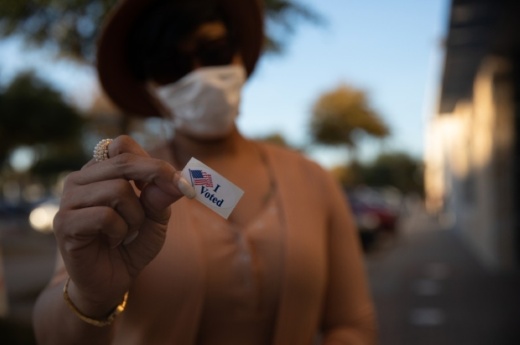Updated 8:30 a.m. Nov. 3
With 99% of polling locations reporting, all eight statewide propositions have likely passed.
Posted 10:20 p.m. Nov. 2
All eight statewide amendments to the Texas state constitution have received majority support with 53% of polling locations reporting as of 10:20 p.m. Nov. 2. Eight propositions made it to every ballot in the state after joint resolutions were approved by the 87th Legislature in May and June.
Close votes on judicial candidate scrutiny
Propositions 4 and 5 focused on powers related to judges and judicial candidates, have the closest margins on the ballot. Brandon Rottinghaus, University of Houston political science professor, said partisan interests were one possible reason why the tallies were separated by a narrow margin.
“Both parties worried that extra rules to follow might limit what judicial candidates might be able to say on the campaign trail,” Rottinghaus said in an email. “As judicial campaigns become more partisan, both parties are looking for a partisan edge to juice turnout. This proposition would more closely police those approaches.”
Rottinghaus said that Democrats opposed the proposition because Republican incumbents hold many positions, and Democratic candidates would face more scrutiny under the new amendment.
Proposition 4’s increase in requirements also worried progressive groups who may want to field younger candidates, according to Rottinghaus.
He also cited a statewide “reluctance to grant more power to government” as one reason why these specific propositions saw close votes.
Election Night results
As of 10:20 p.m. Nov. 2, with 53% of polling locations reporting
Proposition 1 asked voters to consider whether charities for teams sanctioned by the Professional Rodeo Cowboys Association or Women’s Professional Rodeo Association can hold charitable raffles. More voters have supported the proposition with 1,224,406 votes "for" to 236,579 votes "against."
Proposition 2 asked voters whether counties should have the power to whether counties can authorize bonds or notes to finance development in blighted or underserved areas. The amendment is a shortcut for county funding and could help urban counties going through a population boom, Rottinghaus said. Most voters have supported it with a total of 918,744 votes "for" to 536,249 votes "against."
Proposition 3 asked voters whether state or local governments can limit religious services. This measure likely stems from COVID-19 mitigation efforts in 2020, when in-person religious services were limited in parts of Texas, such as Harris and Fort Bend counties, Rottinghaus said. A total of 912,578 votes have been cast "for" compared to 548,535 votes "against."
Proposition 4 asked voters whether the requirements to serve on the Texas Supreme Court, the Texas Court of Criminal Appeals, the Texas Appeals Court or as a district judge should be updated. It would require 10 years of service as a practicing lawyer or a combined 10 years of service in legal practice and as a judge of a state or county court. A total of 833,479 votes have been cast "for" with 584,389 votes cast "against."
Proposition 5 asked voters whether the Texas Commission on Judicial Conduct, which is responsible for disciplining sitting judges, can extend its powers to candidates for the office of a judge in Texas, allowing the commission to conduct investigations, accept complaints and disqualify candidates not in office. Voters have shown support for the proposition with a total of 839,668 votes "for" to 578,625 votes "against."
Proposition 6 asked voters to decide whether residents of facilities such as nursing homes have the right to determine an essential caregiver who can visit without restrictions. This proposition likely stemmed from COVID-19 mitigation measures affecting some care facilities. The majority of voters have approved the proposition with 1,275,369 votes "for" and 176,054 votes "against."
Proposition 7 asked voters to determine whether surviving spouses of disabled people can receive limitations on the amount of property taxes they pay on their homesteads, provided they were age 55 or older when their partners died. Thus far, 1,266,491 votes have been cast "for," while 187,749 votes have been cast "against."
Proposition 8 allows voters to decide whether surviving spouses of armed service members who died in the line of duty will be exempted from all or part of property taxes on homesteads. Voters have shown their support for the proposition with 1,272,793 votes "for" to 178,105 votes "against."
All results are unofficial until canvassed. Visit our online Voter Guide for all local election results in your community.





